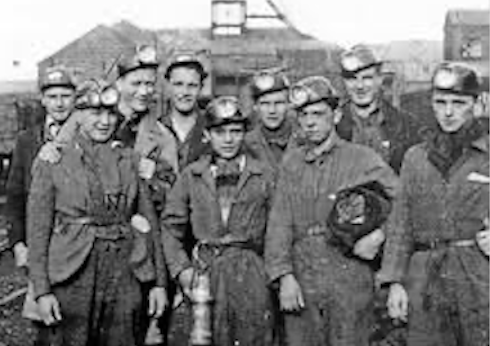- Screen Colours:
- Normal
- Black & Yellow

Suffolk Bevin Boy
AVSFHG event
The Story of a Suffolk Bevin Boy – Barbara McElroy
Marking the final event of what has proved a challenging year for all, we were delighted to welcome Barbara McElroy to give her most entertaining talk about the experiences of her father as a ‘Suffolk Bevin Boy’.
For those unfamiliar with the history of the ‘Bevin Boys’, this was the name given to some 21,000 young British men conscripted by ballot to work in the coal mines of the United Kingdom, between 1943 and 1948. Such a move was deemed necessary in order to increase the rate of coal production which, contrary to government predictions, had declined rapidly through the early years of World War II.
The ‘Bevin Boys’ programme was named after Ernest Bevin, a former trade union official who was to become the Minister of Labour & National Service in the wartime coalition government. Having resisted an initial Government decision to release miners to serve in the military at the outbreak of the second global conflict, Bevin was then left to devise a scheme to ensure that coal stocks were rapidly replenished.
Barbara’s McElroy’s father, now in his 95th year, was a native of Suffolk who had trained as an army cadet at Sudbury, and undergone a medical with a view to serving his country in the military. Instead, he was shocked to receive a letter requiring him to work down the mines, without any effective right of appeal.
Hailing from an area of the country devoid of coal mines, he found himself undergoing only two weeks of safety training, before being sent to work down the mine at Glapwell Colliery, near Chesterfield, equipped with the most basic of equipment, and billeted in a primitive Nissan hut. In a lighter moment, as an illustration of just how cold the accommodation became during the winter months, we were told that one of the ‘Bevin Boys’ had left his false teeth in a mug overnight, only to find them encased in ice the following morning!
Although Barbara’s father gained the respect of regular miners through his willingness to do what he was asked, and work hard, many of his peers were ridiculed for being ‘soft’ and were frequently subjected to bullying. The Bevin Boys were also targets of abuse from the general public, who wrongly believed them to be ‘draft dodgers’ or cowards, and were regularly stopped by the police as suspected deserters.
Unlike many men in the First World War, who were given badges to show they were employed in ‘out of uniform’ jobs, the ‘Bevin Boys’ were afforded no such luxury. Neither were they awarded medals for their important contribution to the war effort, which was only officially recognised by the British government in 1995.
The last of the ‘Bevin Boy’ conscripts were not released from service until 1948 and, although many official records have long since been destroyed, it seems few chose to remain working in the coal-mining industry, instead returning home for further education or to seek employment in other sectors. Many never spoke to their families about their experiences in the mines, where physical injuries and fatal accidents were a common occurrence. Nor did they take pride in the work they had done, instead expressing only regret that they had not served their country as they should have done.
Nonetheless, there endures a strong sense of comradeship among surviving ‘Bevin Boys’, manifested in the ‘Bevin Boys Association’ founded in 1989. Fittingly, a more permanent commemoration of their brave endeavours has been marked by a dedicated monument, unveiled at the National Memorial Arboretum, Staffordshire in 2013. The poignant inscription reads, ‘WE ALSO SERVED’.
Chris Broom
 |
 |
 |
||||
| Barbara McElroy | Les Raymond (Barbara's father) | |||||
 |
 |
|
| Down the mine with a pony (idealised view) |
Bevin Boys' Memorial, National Arboretum |
| This talk is being held online over Zoom and on this occasion will also be available to non-members. We don't normally hold a meeting in December, but please note too that it is on a SECOND Monday. |
||
 |
This is the story of Barbara McElroy's father’s experiences of being conscripted to go down the mines in WW2. With thousands of others, he expected to go into the Forces, but instead was conscripted by ballot to go down the mines, NO excuses allowed. Besides his personal story, the talk looks at the reasons for the scheme, the conditions down the mines, subsequent problems, and tells of its impact on those serving. Please note: Contrary to previous announcements, when this talk was scheduled for 16th March, it is NOT about Leonard Cheshire. |
|